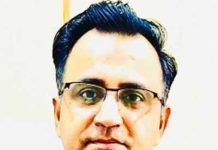What is it like to be transgender in a country wherein the hardliner rightists are largely pervaded? In a country where people are affirmed that there are only two genders i.e., a boy and a girl, it is strenuous for a transgender to live. There is no concept of ‘Third Gender’ in Pakistan. The only fortune set for a trans-person in Pakistan is dancing in different ceremonies before hundreds of nymphomaniac-men, who inappropriately caress the dancers during the performance.
There is another future for them i.e., death on which no inquiries would be conducted, colouring the nights of boozers, or begging on sidewalks. Either way, these Children of a lesser God have to meet the comeuppance for being born differently. This is the quagmire wherein transgenders live. I wonder why people infer this topic as taboo and prefer to not talk about it. Transgenders are not considered human in our country which in many instances leads to Gender Dysphoria.
Transgenders had been living without an identity until the Supreme Court directed the authorities to register the trans-persons and issuance of identity cards, in 2012. However, the inexplicable approach adopted by NADRA has hindered the registration of people with the third gender as argued by Almas Bobi, President Shemale Rights Association. In Pakistan, there are 10,418 transgenders if relied on Census 2017 results and only 18% (1,882) of the transgender population is registered with the country’s database authority.
Contrarily, according to the Court Census 2019, as many as 300,000 transgenders are residing across the country. If the court census and the registration of 1,882 transgenders are taken into consideration, it reveals that only 6.2% of trans-persons are registered. There is a wide gap of 93.8% (unregistered transgenders). It is translucently clear that the third gender is deprived of the attention it deserves as a citizen of this country.
Atrocity and horror always befall this pariah. It is pretty bewildering that the one who attains joy by attending the night-dance parties where transgender’s dance is displayed is the same who does not wince to shoot and get violent against them. We have a surfeit of instances where trans-persons were subjected to different forms of violence.
In 2018, the Supreme Court was told by the secretary of the Law and Justice Commission of Pakistan that as many as 500 transgender people had been killed since 2015. In 2020, it was reported that no less than 69 trans-people had been killed in the KP since 2015. The attacks have been witnessed mainly in the KP. Among many others, two instances were grimmest. One in 2016, where Alisha, 23, an avid trans-rights activist in the KP was shot seven times by a gang that extort money from trans-people.
Adding salt to the injury, the administration at Lady Reading Hospital Peshawar, mocked her by saying whether her blood was HIV-positive and whether they should take her to the male ward or female ward. In addition, they asked Alisha’s friend for a phone number so that they could invite her to a dance party. Thus, Alisha bled to death. Second in 2018 transgender named Nazo was shot dead in her flat in Peshawar and later the body was hacked to pieces.
Notwithstanding our constitution strictly forbids discrimination based on sex, the condition of every transgender across the country is pathetic and terrible and they most often, face relentless discrimination. No law had existed to explicitly protect the rights of transgenders in Pakistan until the Transgender Person (Protection of Rights) Act 2018. It aims at granting the basic rights to trans-persons including Identity Cards, passports, driver’s licenses, and education certificates. Furthermore, it explicitly bans discrimination against transgender people by employers, organisations, educational institutions, etc. However, these laws have brought fewer changes in the behaviour of our society.
Many governmental and non-governmental organisations are rendering plausible service, but all are somehow missing a crucial point: ‘ ‘educating the society’. Nevertheless, initiatives taken by the government are praiseworthy such as the first Transgender protection center of Pakistan in Islamabad was founded by Dr. Shireen Mazari federal minister of Human Rights last year, which pledges to protect transgenders and provide services regarding physical health, mental health, career counseling, and legal help. Further, it would work to implement the Trans-protection act in letter and spirit. The government also included transgenders in its Ehsaas Program and Health Card initiative.
Earlier in 2018, the Pakistan Institute of Medical Sciences, PIMS-Islamabad, has dedicated a separate ward for transgenders. In 2019, Aysha Moghul was the first transgender woman to be appointed to the human rights ministry. Similarly, in 2016, Ittihad-e-Tanzeemat-Madaris Pakistan released a decree (fatwa) legalising transgender marriage in Islam. These improvements are laudable but in a broader perspective, there is a lot more which needs to be worked on and materialised.
Transgender in Pakistan are not being feted but treated as a pariah of society. Not owned in any sector. Home, school, college, university, and workforce turn their faces when seeing a trans-person coming. A significant percentage of transgenders is uneducated, having not even a basic level of education. First, they are thrown out of their homes by their parents, second, society makes them realise their worth by catcalling with different names such as Hijra, Chakka, Khusra, etc. These words have now become bywords that are used to defy a person’s manliness (Mardhoyakhusryho? Means, are you a man or a eunuch?). Imagine the word which upsets men but is used for calling a transgender, how would they feel? Anyhow, then, they are left alone and have no choice but to dance at weddings, take alms at baby’s birth or become a sex-toy.
According to a survey of 2016, 51% transgenders earn money by dancing, 15% from sex work, and 12% from begging. This society does not provide transgenders with the opportunity to become successful people, leading them to become victims of Gender Dysphoria (mental stress and feeling of being an alien in society). We have some examples of successful transgenders. Sara Gill, the first transgender to become a doctor. Marvia Malik, becoming the first transgender news reporter. Similarly, Nisha Rao became the first transgender lawyer. But is it enough to put an end to transgender’s misery?
Our society over years has become so stiff that it doesn’t comprehend the third gender as a human being. Despite all the decrees, laws, amendments, initiatives, the emergence of different watchdogs, we remain unturned. There is a need for some substantial changes. We need to utilise our human resources including transgenders by giving them way in our political system. It may sound arduous but it is not impossible. Pakistan needs to look at the world and it will find a plethora of examples where transgenders are serving their countries quite well.
Sara McBride (transgender) is a member of the Delaware Senate, the United States. Similarly, Audrey Tang is also a transgender serving as a digital minister of Taiwan. And Petra De Sutter (trans) is a deputy prime minister of Belgium. Why can Pakistan not allocate, if not more, a 2% quota for transwomen and transmen? In our legislative assemblies, there is an 83% quota for men representing men and a 17% quota for women representing women but who are representing transgenders? How much quota for them?
Secondly, bringing inclusivity in government jobs and mentioning in the advertisement the third gender, can also be helpful. Organise a social security system for transgenders that would look after the transgender kids regarding their nurturing, education, and finding job opportunities for them. The inclusion of transgenders in administration, law enforcement, Judiciary can be very significant in protecting them. Parents who abandon their children for being transgenders, take stringent action against them because parents’ love is most valuable for a child in this case. Educate the public by creating awareness and rationalising the understanding of the third gender. Because if we educate our children about transgenders and their basic rights, it means we are making them more trans-friendly rather than transphobic.
Lastly, these questions remain. Why do transgenders have to be the victim of transphobia, physical abuse, emotional abuse, financial abuse, sexual violence, torture, and sometimes death? Is our country not big enough to accommodate this community and provide them with their basic rights? We enjoy their dance, and we pay [or do not pay] them to fill colours in our nights but we are also transphobic. Actually, it is a big question, what are we?
Sign in
Welcome! Log into your account
Forgot your password? Get help
Password recovery
Recover your password
A password will be e-mailed to you.







